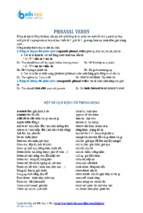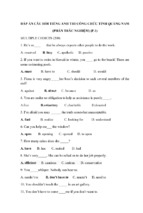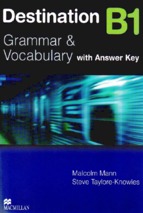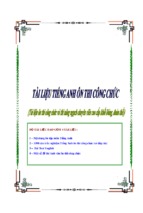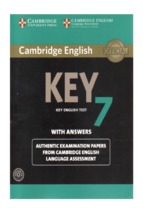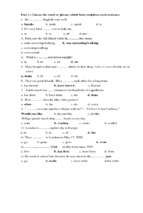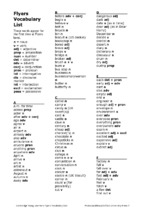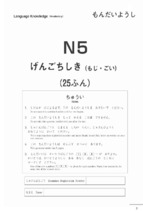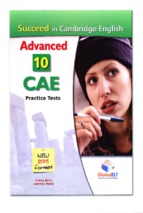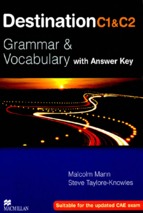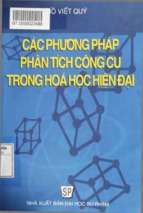Choose the word whose underlined part is pronounced differently from that of the others.
Question 1: A. deleted
B. started
C. retarded
D. stopped
Question 2: A. think
B. thank
C. that
D. three
Pick out the word that has the primary stress different from that of the other words.
Question 3: A. advise
B. parent
C. apply
D. attract
Question 4: A. academic
B. necessity
C. authority
D.
commercially
Mark the letter A, B, C, or D on your answer sheet to indicate the underlined part that needs
correction in each of the following questions
Question 5: Halley’s comet, viewing through a telescope, was quite impressive.
A
B
C
D
Question 6: There are a car and two vans in front of my house.
A
B
C
D
Question 7: All her children have graduated from university, that is the reason for her to be proud.
A
B
C
D
Mark the letter A, B, C, or D on your answer sheet to indicate the correct answer to each of the
following questions.
Question 8: For the last 20 years, we______ significant changes in the world of science and technology.
A. witness
B. have witnessed
C. witnessed
D. are witnessing
Question 9: Housewives find it easier to do domestic chores thanks to_____ invention of labour-saving
devices.
A. the
B. a
C. an
D. some
Question 10: Air pollution is getting _______ serious in big cities in the world.
A. more and more
B. the more and the more
C. the most and the most
D. most
and most
Question 11: Ms Brown asked me __________ in my class.
A. there were how many students
B. how many students there were
C. were there how many students
D. how many students were there
Question 12: Her fiancé is said________from Harvard University five years ago.
A. having graduated
B. to have graduated
C. being graduated
D. to be graduated
Question 13: Many rare and precious species are now _______the verge of extinction.
A. in
B. from
C. on
D. by
Question 14: They are always_______ of what their children do.
A. support
B. supporting
C. supportive
D. supportively
Question 15: Women in some parts of the world are still struggling for_______ job opportunities to men.
A. equal
B. various
C. suitable
D. legal
Question 16: The manager_______ his temper with the employees and shouted at them.
A. had
B. lost
C. took
D. kept
Question 17: All nations should_______ hands to work out a plan to solve the problem of global
warming.
A. join
B. hold
C. shake
D. lend
Question 18: Garvin is_______ a new computer application to see whether it works.
A. looking after
B. putting on
C. trying out
D. turning up
Question 19: Terry is a very imaginative boy. He always comes_______ interesting ideas.
Â.out of
B. down on
C. up with
D. in for
Mark the letter A, B, C, or D on your answer sheet to indicate the word(s) CLOSEST in meaning to
the underlined word(s) in each of the following questions.
Question 20: She got up late and rushed to the bus stop.
A. came into
B. went leisurely
C. dropped by
D. went quickly
Question 21: It will take more or less a month to prepare for the wedding.
A. approximately
B. simply
C. generally
D. frankly
Mark the letter A, B, C, or D on your answer sheet to indicate the word(s) OPPOSITE in meaning
to the underlined word(s) in each of the following questions.
Question 22: She was unhappy that she lost contact with a lot of her old friends when she went abroad
to study.
A. lost control of
B. got in touch with
C. made room for
D. put in charge of
Question 23: Mr. Smith’s new neighbors appear to be very friendly.
A. inapplicable
B. futile
C. hostile
D. amicable
Mark the letter A, B, C, or D on your answer sheet to indicate the most suitable response to
complete each of the following exchanges.
Question 24: Tom: I thought your tennis game was a lot better today, Tony.
Tony:____________! I thought it was terrible.
A. You’ve got to be kidding
B. You can say that again
C. No, I don’t think so
D.
Thanks! Same to you
Question 25: “What do you want me to cook for your dinner?” - “_________”
A. Yeah, your meal is great.
B. It’s up to you.
C. Let me go.
D. Yes, give up.
Mark the letter A, B, C or D on your answer sheet to indicate the sentence that is closest in meaning
to each of the following questions.
Question 26: His eel soup is better than any other soups I have ever eaten.
A. Of all the soups I have ever eaten, his eel soup is the best.
B. I have ever eaten many soups that are better than his eel soup.
C. His eel soup is good but I have ever eaten many others better.
D. His eel soup is the worst of all soups I have eaten.
Question 27: Many people think that Steve stole the money.
A. It was not Steve who stole the money.
B. The money is thought to be stolen by Steve.
C. Many people think the money is stolen by Steve.
D. Steve is thought to have stolen the money.
Question 28: I have not met her for three years.
A. I did not meet her three years ago.
B. During three years, I met her once.
C. It is three years when I will meet her.
D. The last time I met her was three years ago.
Mark the letter A, B, C or D on your answer sheet to indicate the sentence that best combines each
pair of sentences in the following questions.
Question 29: Anna jogs every morning. It is very good for her health.
A. Anna jogs every morning that is very good for her health.
B. Anna jogs every morning, which is very good for her health.
C. Anna jogs every morning and then it is good for her health.
D. Anna jogs every morning and is good for her health.
Question 30: Mary was very disappointed, but she tried to keep calm.
A. Feeling disappoined, Mary tried to keep calm, but she failed.
B. Mary was too disappointed to keep calm.
C. Mary lost her temper because of her disappointment
D. Disappointed as she was, Mary tried to keep calm
Read the following passage and mark the letter A, B, C, or D on your answer sheet to indicate the
correct word or phrase for each of the blanks.
Why do people often get uptight and worried before meeting someone for the first time? It is often
said that (31)______a good first impression is very important, and according to recent studies, it appears
that there is something to it. In his book, Blink, author Malcolm Gladwell says that we form an opinion of
someone in the first 2 seconds after meeting them. In other words, if Gladwell is right, most of us pass
(32)______on people we meet almost immediately. It makes(33)______that we create a better first
impression when we’re friendly. A warm smile can really make a difference.
And then if we have interests (34)______common, the other person may feel they want to get t know us.
However, when we meet someone from abroad who (35)______a foreign language, there’s no need we
have to keep our distance from them. If we decided to take the trouble to communicate, we might make a
new friend.
Question 31: A. doing
B. making
C. passing
D. having
Question 32: A. prejudice
B. judgement
C. impression
D. doubt
Question 33: A. logic
B. sense
C. interest
D. friends
Question 34: A. in
B. by
C. with
D. to
Question 35: A. speaks
B. asks
C. says
D. talks
Read the following passage and mark the letter A, B, C or D on your answer sheet to indicate the
correct answer to each of the questions from 36 to 42.
Esperanto is what is called a planned, or artificial language. It was created more than a century ago
by Polish eye doctor Ludwik Lazar Zamenhof. Zamenhof believed that a common language would help to
alleviate some of the misunderstandings among cultures.
In Zamenhof’s first attempt at a universal language, he tried to create a language that was as
uncomplicated as possible. This first language included words such as ab, ac, eb, be and ce. This did not
result in a workable language in that these monosyllabic, though short, were not easy to understand or to
retain.
Next, Zamenhof tried a different way of constructing a simplified language. He made the words in
his language sound like words that people already knew, but he simplified the grammar tremendously.
One example of how he simplified the language can be seen in the suffixes: all nouns in this language end
in o, as in the noun amiko, which means “friend”, and all adjectives end in -a, as in the adjective bela,
which means “pretty”. Another example of the simplified language can be seen in the prefix mal-, which
makes a word opposite in meaning, the word malamiko therefore means “enemy”, and the word malbela
therefore means “ugly” in Zamenhof’s language.
In 1887, Zamenhof wrote a description of this language and published it. He used a pen name, Dr.
Esperanto, when signing the book. He selected the name Esperanto because this word means “a person
who hopes” in his language. Esperanto clubs began popping up throughout Europe, and by 1950,
Esperanto had spread from Europe to America and Asia.
In 1905, the First World Congress of Esperanto took place in France, with approximately 700
attendees from 20 different countries. Congresses were held annually for nine years, and 4,000 attendees
were registered for the Tenth World Esperanto Congress scheduled for 1914, when World War I erupted
and forced its cancellation.
Esperanto has had its ups and downs in the period since World War I. Today, years after it was
introduced, it is estimated that perhaps a quarter of a million people are fluent in it. This may seem like a
large number, but it is really quite small when compared with the billion English speakers and billion
Mandarin Chinese speakers in today’s world. Current advocates would like to see its use grow
considerably and are taking steps to try to make this happen.
Question 36: The topic of this passage is ________.
A. one man’s efforts to create a universal language
B. using language to communicate internationally
C. a language developed in the last few years
D. how language can be improved
Question 37: According to the passage, Zamenhof wanted to create a universal language
A. to build a name for himself
B. to provide a more complex language
C. to create one world culture
D. to resolve cultural differences
Question 38: The expression “popping up” could best be replaced by ________.
A. opening
B. shouting
C. hiding
D. leaping
Question 39: According to passage, what happened to the Tenth World Esperanto Congress?
A. It had attendees from 20 countries
B. It had 4,000 attendees
C. It never took place
D. It was scheduled for 1915
Question 40: The expression “ups and downs” is closest in meaning to ________.
A. highs and lows
B. floors and ceilings C. take offs and landings
D. tops and bottoms.
Question 41: Which paragraph describes the predecessor to Esperanto?
A. The first paragraph B. The second paragraph
C. The third paragraph D. The fourth paragraph
Question 42: The passage would most likely be assigned reading in a course on ________.
A. European history
B. English grammar
C. world government
D. applied linguistics
Read the following passage and mark the letter A, B, C, or D on your answer sheet to indicate the
correct answer to each of the following questions.
ENVIRONMENTAL ACTIVISTS
Paul Watson is an environmental activist. He is a man who believes that he must do something,
not just talk about doing something. Paul believes in protecting endangered animals, and he protects them
in controversial ways. Some people think that Watson is a hero and admire him very much. Other people
think that he is a criminal.
On July 16th, 1979, Paul Watson and his crew were on his ship, which is called the Sea
Shepherd. Watson and the people who work on the Sea Shepherd were hunting on the Atlantic Ocean
near Portugal. However, they had a strange prey; instead of hunting for animals, their prey was a ship, the
Sierra. The Sea Shepherd found the Sierra, ran into it and sank it. As a result, the Sierra never returned to
the sea. The Sea Shepherd, on the other hand, returned to its home in Canada. Paul Watson and his
workers thought that they had been successful.
The Sierra had been a whaling ship, which had operated illegally. The captain and the crew of
the Sierra did not obey any of the international laws that restrict whaling. Instead, they killed as many
whales as they could, quickly cut off the meat, and froze it. Later, they sold the whale meat in countries
where it is eaten.
Paul Watson tried to persuade the international whaling commission to stop the Sierra. However,
the commission did very little, and Paul became impatient. He decided to stop the Sierra and other
whaling ships in any way that he could. He offered to pay $25,000 to anyone who sank any illegal
whaling ship, and he sank the Sierra. He acted because he believes that the whales must be protected.
Still, he acted without the approval of the government; therefore, his actions were controversial.
Paul Watson is not the only environmental activist. Other men and women are also fighting to
protect the Earth. Like Watson, they do not always have the approval of their governments, and like
Watson, they have become impatient. Yet, because of their concern for the environment, they will act to
protect it.
Question 43. According to the passage, an environmental activist is someone who __________.
A. is a hero, like Paul Watson
B. talks about protecting endangered species
C. does something to protect the Earth
D. runs into whaling ship
Question 44. When something is "controversial", ________.
A. people protect it
B. people have different ideas about it
C. everyone disagrees with it
D. everyone agrees with it
Question 45. The members of a ship's crew are __________.
A. the people who own the ship
B. the people who work at sea
C. all of the people on a ship, including the passengers D. the men and women who work on the ship
Question 46. The main idea of paragraph 1 is that __________.
A. activists are people who do something
B. Pual Watson is a hero to some people
C. Paul Watson is a controversial environmental activist D. Paul Watson does not believe in talking
Question 47. The Sea Shepherd once hunted _____.
A. the Atlantic Ocean
B. the Sierra
C. whales
D. Portugal
Question 48. The author implies that Paul Watson lives in _______.
A. Canada
B. Portugal
C. a ship on the Atlantic
D. the Sierra
Question 49. In paragraph 3, the word "it" in bold refers to ______.
A. whale meat
B. the Sierra
C. the Sierra crew
D. whales
Question 50. Watson ran into the Sierra because __________.
A. he noticed a strange prey
B. he wanted to sink the ship
C. he was impatient with the government's actions
D. he wanted
ĐÁP ÁN ĐỀ THI THỬ TIẾNG ANH
Câu
1
2
3
4
5
6
7
8
9
10
Đáp án
D
C
B
A
A
A
C
B
A
A
Câu
11
12
13
14
15
16
17
18
19
20
Đáp án
B
B
C
C
A
B
A
C
C
D
Câu
21
22
23
24
25
26
27
28
29
30
Question 1: Đáp án D
Phần gạch chân câu D được phát âm là /t/ còn lại là /id/
Question 2: Đáp án C
Phần gạch chân câu C được phát âm là /ð/ còn lại là /θ/
Question 3: Đáp án B
Câu B trọng âm rơi vào âm tiết thứ nhất, còn lại là thứ 2
Question 4: Đáp án A
Câu A trọng âm rơi vào âm tiết thứ 3, còn lại là thứ 2
Đáp án
A
B
C
A
B
A
D
D
B
D
Câu
31
32
33
34
35
36
37
38
39
40
Đáp án
B
B
B
A
A
A
D
D
C
A
Câu
41
42
43
44
45
46
47
48
49
50
Đáp án
B
D
C
B
D
C
B
A
A
C
Question 5: Đáp án A
viewing => viewed/which was viewed
Ở đây ta phải dùng mệnh đề quan hệ để thay thế cho “comet” ở phía trước. Trong câu này vì trước đó có
dấu phảy nên ta bắt buộc dùng “which” chứ không dùng “that” (ngoài ra ta có thể dung mệnh đề quan hệ
rút gọn bằng cách dùng dạng quá khứ phân từ “viewed”)
Tạm dịch: Sao chổi Halley, được nhìn xuyên qua kính thiên văn, khá ấn tượng.
Question 6: Đáp án A
are => is Nếu danh từ trong chuỗi liệt kê bắt đầu là danh từ số ít hoặc danh từ không đếm được, chúng ta
dùng “There is”. Nếu danh từ trong chuỗi liệt kê bắt đầu là danh từ số nhiều, chúng ta dung “There are”.
Trong câu này, danh từ bắt đầu là “a car” (số ít) nên ta phải dùng There is
Tạm dịch: Có một chiếc xe hơi và hai chiếc xe tải trước nhà tôi.
Question 7: Đáp án C
that => which .Mệnh đề quan hệ “that” không đứng đằng sau dấu phảy, vì thế dùng “that” là sai. Ta dùng
mệnh đề quan hệ “which” để thay thế cho cả 1 vế câu ở phía trước.
Tạm dịch: Tất cả các con của cô đã tốt nghiệp đại học, đó là lý do để cô tự hào.
Question 8: Đáp án B
Thì HTHT vì có dấu hiệu “for the last 20 years”
Question 9: Đáp án A
Dùng mạo từ “the” để nói đến một phát minh cụ thể.
Question 10: Đáp án A
Cấu trúc so sánh : more and more + long adj/ adv: ngày càng...
Câu này dịch như sau: Ôi nhiễm không khí trở nên ngày càng nghiêm trọng ở các thành phố lớn trên thế
giới
Question 11: Đáp án B
Câu trực tiếp – gián tiếp dạng câu hỏi có từ để hỏi
Question 12: Đáp án B
Cấu trúc câu bị động dạng đặc biệt (Chuyên đề thẻ 3 buổi 3) S + be + said + to have done st.
Hành động tốt nghiệp xảy ra trước hành động “say” nên phải dùng động từ ở dạng “to have done”.
Câu này dịch như sau: Chồng sắp cưới của cô ấy được cho rằng đã tốt nghiệp trường Harvard cách đây 5
năm.
Question 13: Đáp án C
Cụm từ: on the verge of extinction (idm): trên bờ vực tuyệt chủng.
Câu này dịch như sau: Nhiều loài thú quý hiếm đang trên bờ vực tuyệt chủng.
Question 14: Đáp án C
Cụm từ : Be supportive of: ủng hộ. Cần một tính từ bổ nghĩa cho chủ ngữ (they) đằng sau động từ “are”
và trước giới từ“of”.
Câu này dịch như sau: Họ luôn ủng hộ việc con họ làm.
Question 15: Đáp án A
Equal: bình đẳng; Various: đa dạng; Suitable: thích hợp; Lagal: hợp pháp
Câu này dịch như sau: Phụ nữ ở một vài nơi trên thế giới vẫn đang đấu tranh để giành lấy những cơ hội
việc làm bình đẳng với nam giới.
Question 16: Đáp án B
Cụm từ : lose one’s temper : mất bình tĩnh
Câu này dịch như sau: Người quản lý đã mất bình tĩnh với nhân viên và la mắng họ.
Question 17: Đáp án A
Cụm từ : join hands (with somebody) to do something: chung tay, cùng nhau làm gì
Câu này dịch như sau: Tất cả các nước nên chung tay thực hiện kế hoạch giải quyết vấn đề hiệu ứng nhà
kính.
Question 18: Đáp án C
Look after: chăm sóc; Put on: mặc vào
Try out: to test or use somebody/something in order to see how good or effective they are: Thử dùng cái
gì
Turn up: được tìm thấy tình cờ sau một thời gian thất lạc
Câu này dịch như sau: Garvin đang thử một ứng dụng máy tính mới để xem nó có hoạt động tốt không?
Question 19: Đáp án C
Cụm động từ: come up with interesting ideas: nghĩa ra các ý tưởng thú vị
Câu này dịch như sau: Terry là một chàng trai có trí tưởng tượng phong phú. Anh ấy luôn nghĩ ra các ý
tưởng thú vị.
Question 20: Đáp án D
Rush: chạy vội vàng, chạy thật nhanh = go quickly.
Cô ấy dậy muộn và phải chạy vội ra bến xe buýt.
Question 21: Đáp án A
More or less: xấp xỉ, vào khoảng = approximately.
Mất xấp xỉ 1 tháng để chuẩn bị cho đám cưới.
Question 22: Đáp án B
Lose contact with (mất liên lạc với) >< get in touch with (giữ liên lạc với)
Cô ấy buồn vì cô ấy đã mất liên lạc với rất nhiều bạn bè cũ khi cô ấy đi du học nước ngoài.
Question 23: Đáp án C
Hostile (thù địch,căm ghét) >< friendly (thân thiện).
Hàng xóm mới của ông Smith có vẻ như rất thân thiện.
Question 24: Đáp án A
Tom khen Toney chơi tennis hôm nay rất hay, nhưng Tony lại thấy mình chơi dở, anh ấy nói
“You’ve got to be kidding.” (Chắc là anh đang đùa phải không.) .
“I don’t think so” không thể sử dụng được vì các câu nói này ở thì quá khứ đơn.
Question 25: Đáp án B
Khi được hỏi muốn được nấu gì cho ăn, câu trả lời “It‟s up to you” (tùy bạn) là phù hợp nhất.
Question 26: Đáp án A
A.Trong tất cả các món súp tôi từng anh, món súp lươn của anh ấy là tuyệt nhất.
B.Tôi đã ăn rất nhiều súp ngon lành hơn món súp lươn của anh ấy.
C. Món súp lươn của anh ấy rất tuyệt nhưng tôi ăn nhiều món súp khác ngon hơn.
D. Món súp lươn của anh ấy là tồi tệ nhất trong những món súp tôi từng ăn.
Question 27: Đáp án D
Câu bị động dạng đặc biệt (thẻ 3 buổi 3)
Question 28: Đáp án D
Lần cuối cùng làm gì là bao giờ The last time + S + V (qk) + … + was + …(Chyên đề thẻ 2)
Question 29: Đáp án B
Đại từ quan hệ “which” chỉ hành động chạy bộ mỗi sáng của Anna, làm liên từ nối 2 mệnh đề với nhau
mà không cần ngắt câu.
Question 30: Đáp án D
Cấu trúc “Adj + as + S + be, ...” Mặc dù ai đó đang thế nào đấy, nhưng ...
Mặc dù Mary đang thất vọng, cô ấy cố gắng giữ bình tĩnh.
Question 31: Đáp án B
To make an impression: tạo ấn tượng
Question 32: Đáp án B
prejudice (n): thiên kiến; thành kiến ; impression (n): ấn tượng; judgement (n): đánh giá; doubt (n): nghi
ngờ
Question 33: Đáp án B
To make sense: có lý, có ý nghĩa, hợp lý
Question 34: Đáp án A
...in common: chung, (sở thích) giống nhau
Question 35: Đáp án A
speak (v): nói ; say (v): nói; ask (v): hỏi, yêu cầu ; talk (v): nói chuyện. Nói một ngôn ngữ, ta dùng
“speak”
Dịch bài đọc:
Tại sao mọi người thường căng thẳng và lo lắng trước khi gặp ai đó lần đầu tiên? Người ta thường
nói rằng tạo một ấn tượng đầu tiên tốt là rất quan trọng, và theo những nghiên cứu gần đây, có vẻ như có
một cái gì đó liên quan đến nó. Trong cuốn sách của mình, Blink, tác giả Malcolm Gladwell nói rằng
chúng ta hình thành quan điểm về ai đó trong 2 giây đầu tiên sau khi gặp họ. Nói cách khác, nếu Gladwell
đúng, hầu hết chúng ta đánh giá về những người mà chúng ta gặp
gần như ngay lập tức. Điều đó có nghĩa là chúng ta tạo ấn tượng đầu tiên tốt hơn khi chúng ta than thiện.
Một nụ cười ấm áp thực sự có thể tạo sự khác biệt. Và nếu chúng ta có sở thích chung, người kia có thể
cảm thấy họ muốn biết chúng ta. Tuy nhiên, khi chúng ta gặp ai đó nước ngoài nói tiếng nước ngoài,
chúng ta không cần phải giữ khoảng cách với họ. Nếu chúng ta quyết định chấp nhận rắc rối để giao tiếp,
chúng ta có thể làm quen một người bạn mới.
Question 36. Đáp án A
Toàn bộ đoạn văn nói về nỗ lực của Zamenhof trong việc xây dựng một ngôn ngữ riêng mang tính toàn
cầu. Tập trung chủ yếu là ở đoạn 1. Đây là mở bài theo cách diễn dịch.
=> one man’s efforts to create a universal language.
Question 37. Đáp án D (P1;L2,3)
Question 38. Đáp án D
Pop up = leap (nhảy lên, nổi lên) ; Open: mở ra ; Shout: hét lên; Hide: ẩn nấp
Question 39. Đáp án C (P5;L2,3)
Question 40. Đáp án A
Ups and downs = highs and lows (Có lúc thăng lúc trầm)
Question 41. Đáp án B (P2)
Question 42. Đáp án D
Đoạn văn này rất có thể được tìm thấy trong bài học của khóa học “Ngôn ngữ ứng dụng.” => applied
linguistic
Question 43. Đáp án C (P1;L1,2)
Question 44. Đáp án B
“controversial” (adj): gây tranh cãi, tranh luận = people have different ideas about it
Question 45. Đáp án D (P2;L1,2)
Question 46. Đáp án C (P1)
Question 47. Đáp án B (P2;L2,3)
Question 48. Đáp án A (P2;L4,5)
Question 49. Đáp án A (P3; L2,3)
Question 50. Đáp án C (P4,L2)
- Xem thêm -

